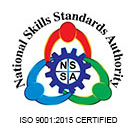|
Semi-skilled worker
|
Certificate 1
|
- Demonstrate basic knowledge by recall in a narrow range of area
- Perform basic or preparatory practical skills in a defined range of tasks
- Carry out routine tasks given with clear direction
- Demonstrate understanding of safety requirements
- Receive and pass on information related to the work
- Access and record information related to the work
- Take limited responsibility for output of self
|
|
Skilled worker
|
Certificate 2
|
- Demonstrate basic operational knowledge in a moderate range of area
- Perform practical skills in a range of varied tasks
- Demonstrate a prescribed range of functions involving known routines and procedures
- Perform tasks that involve some complex or non routine activities autonomously or in collaboration with others as part of a group of team
- Receive and pass on information related to the work
- Access and record information related to the work
- Take some responsibility for the quality of outputs
|
|
Advanced Skilled Worker
|
Certificate 3
|
- Demonstrate some relevant theoretical knowledge
- Apply a range of well developed skills
- Apply known solutions to a variety of predictable problems
- Perform tasks that require a range of well-developed skills with some judgment as required
- Interpret available information
- Take responsibility for own outputs
- Take limited responsibility for the work of others
|
|
Supervisory
|
Certificate 4
|
- Demonstrate understanding of a broad knowledge base, and apply some theoretical concepts
- Apply solutions to a defined range of unpredictable problems
- Identify and apply skills and knowledge to a wide variety of contexts
- Identify, analyze and evaluate information from various sources
- Understand and take responsibility for quality, safety and environmental issues
- Supervise the work of others
- Take limited responsibility for the quantity and quality of the outputs of others
|
